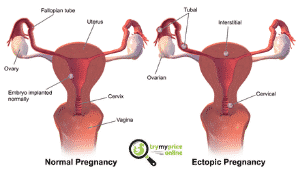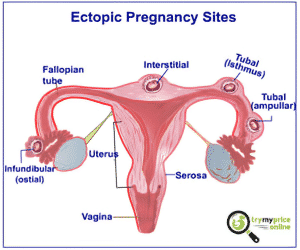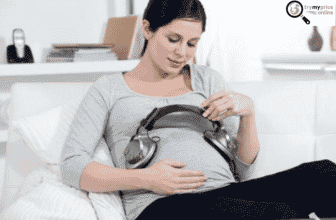
Tubal pregnancy, A fertilized egg implants and matures in the uterus during a normal pregnancy (also called the womb). The fertilized egg does not make it to the uterus in an ectopic pregnancy. It implants in a separate part of the body, usually the fallopian tube. This is known as a “tubal pregnancy.” The ovary, cervix, or abdomen can all be affected.
Related: Pregnancy test calculator week by week

Ectopic pregnancy treatment
Tubal pregnancy
For the mother, an ectopic pregnancy might be risky. The organ in which it is inserted may rupture as the pregnancy proceeds (burst).
This can result in significant internal bleeding. That is why detecting an ectopic pregnancy early is crucial.
You can download a tubal pregnancy guide from amazon
Related: B6 And Unisom during Pregnancy: Is It Safe?
Ectopic pregnancy signs and symptoms
Early signs of an ectopic pregnancy resemble those of a normal pregnancy:
Periods missed
supple breasts
Nausea
Vomiting
Fatigue
Urinating frequently
A positive pregnancy test at home
The following are some of the initial indicators of an ectopic pregnancy:
Vaginal bleeding is unusual.
Low back ache
Mild abdominal or pelvic pain
Mild pelvic cramps on one side.
Related: Glucose test pregnancy and its importance
Call your doctor if you find these signs
An ectopic pregnancy may rupture as it develops. You may then develop more significant symptoms. Some examples are:
Sudden, acute abdominal or pelvic pain
Shoulder discomfort
Feeling dizzy, faint, or weak
If you have any of these symptoms, visit a doctor right once.

cvs pregnancy test faint line
What causes a pregnancy to become ectopic?
When a fertilized egg is unable to travel down the fallopian tube quickly enough, an ectopic pregnancy ensues.
A tube might become partially or totally blocked due to an infection or inflammation.
Pelvic inflammatory illness is a common cause of this (PID).
Endometriosis is another prevalent cause of tube blockage. This occurs when cells from the uterine lining develop outside the uterus.
Inside the fallopian tube, the cells can proliferate and clog it.
The tube can potentially be blocked by scar tissue from earlier surgical treatment or fallopian tube surgery.
Ectopic pregnancy can happen at any time. However, you’re more likely to get one if you:
You have reached the age of 35.
You’ve had infections or procedures in the pelvic area (such as pelvic inflammatory disease).
You’re suffering from endometriosis.
To get pregnant, you’re employing assisted reproductive technologies like in vitro fertilization (IVF).
You’re a smoker.
You have a history of fallopian tube inflammation or irregular fallopian tube morphology.
Related: Protein creatinine ratio pregnancy calculator and its usage
What are the symptoms of an ectopic pregnancy?
Tubal pregnancy is difficult to detect at first since the symptoms are similar to those of a normal pregnancy.
If your doctor suspects an early miscarriage, he or she may take the following steps:
Check the size and shape of your uterus with a pelvic exam.
Check your dimensions of personal chorionic gonadotropin with a pee and blood test (hCG).
This is a hormone that the placenta produces. You may have a low hCG level if you have an ectopic pregnancy.
Transvaginal ultrasound should be performed. A wand is put into your vaginal canal during this operation.
Sound waves from the wand create images of human organs.
This will enable your doctor to monitor the pregnancy’s progress.
Related: Early pregnancy discharge in detail
Tubal pregnancy

All in all, Tubal pregnancy can be emotionally draining. You may be sad, irritated, or perplexed. Talk to your partner, a trustworthy family member, or a friend about your feelings. Allow yourself the opportunity to talk to a family member or friend about your feelings. Allow yourself to mourn the pregnancy loss.
References:







